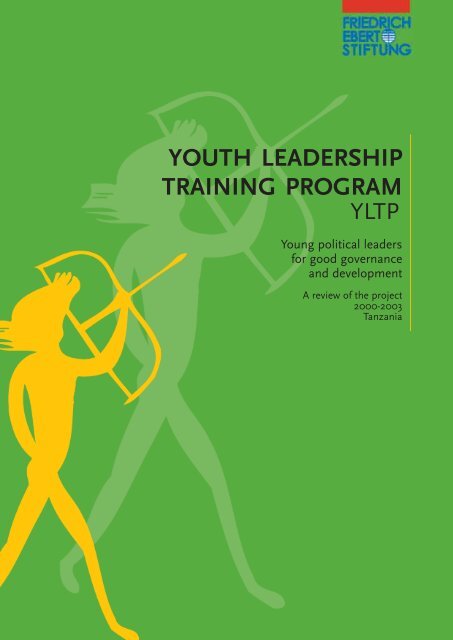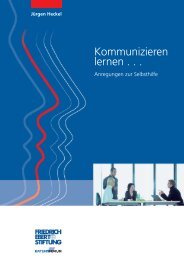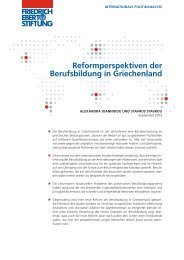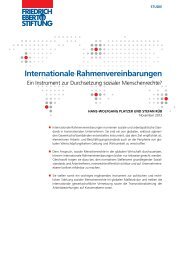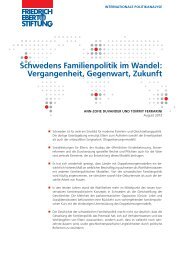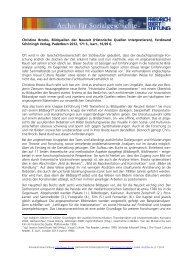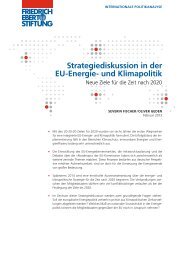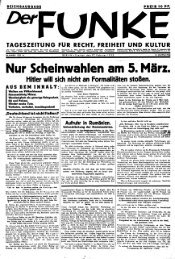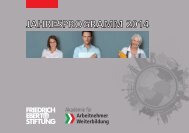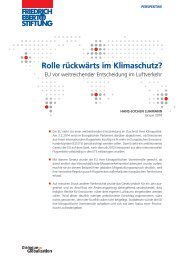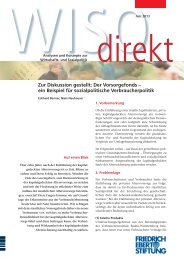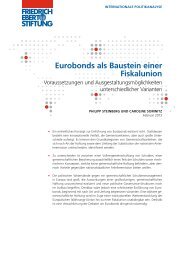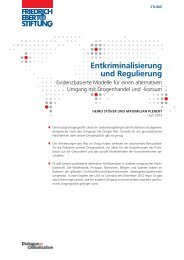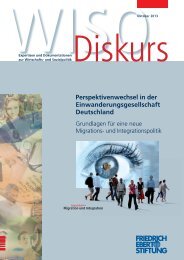Youth Leadership Training Program - Bibliothek der Friedrich-Ebert ...
Youth Leadership Training Program - Bibliothek der Friedrich-Ebert ...
Youth Leadership Training Program - Bibliothek der Friedrich-Ebert ...
Create successful ePaper yourself
Turn your PDF publications into a flip-book with our unique Google optimized e-Paper software.
YOUTH LEADERSHIP<br />
TRAINING PROGRAM<br />
YLTP<br />
Young political lea<strong>der</strong>s<br />
for good governance<br />
and development<br />
A review of the project<br />
2000-2003<br />
Tanzania
Editors<br />
Valéria Salles<br />
Peter Häussler<br />
Assistants<br />
Nora Kempmann<br />
Amon Petro<br />
YLTP Coordinator<br />
Prof. Max Mmuya<br />
FES Resident Director<br />
Peter Häussler<br />
Proof-rea<strong>der</strong><br />
Kate Girvan<br />
Graphic Design<br />
Petra’s Maridadi Ltd.<br />
Caricatures<br />
From Art in Politics - Sanaa Katika Siasa, FES 2001<br />
p. 15 Godfrey Mwampembwa - Gado, p.16 Ali Masoud - Kipanya<br />
p. 20 James Mpuya - Gayo, p. 22 Godfrey Mwampembwa - Gado<br />
p. 27 Godfrey Mwampembwa - Gado<br />
© <strong>Friedrich</strong> <strong>Ebert</strong> Stiftung - FES<br />
Tanzania, 2003<br />
ISBN 9987 - 22 - 039 - 8
Contents<br />
Preface 3<br />
1 Introduction 5<br />
2 Preparations to set up the YLTP 6<br />
2.1 Why a <strong>Youth</strong> <strong>Lea<strong>der</strong>ship</strong> <strong>Training</strong> <strong>Program</strong>? 6<br />
2.2 What kind of lea<strong>der</strong>ship did the YLTP expect to contribute to? 6<br />
2.3 What was the concept of the program? 7<br />
2.4 What were the program’s assumptions and basic conditions? 9<br />
2.5 What was the approach to the training? 10<br />
2.6 How were the contents defined? 10<br />
3 An overview of the training sessions 11<br />
Session 1 6 December 2000 12<br />
Session 2 15 December 2000 13<br />
Session 3 22–23 January 2001 14<br />
Session 4 23–24 February 2001 15<br />
Session 5 30–31 March & 1 April 2001 16<br />
Session 6 27–28 April 2001 17<br />
Session 7 1–2 June 2001 18<br />
Session 8 3–4 August 2001 19<br />
Session 9 28–30 September 2001 20<br />
Session 10 12–13 October 2001 21<br />
Session 11 2–3 November 2001 22<br />
Session 12 25–26 January 2002 23<br />
Session 13 8–9 March 2002 24<br />
Session 14 27–28 March 2002 25<br />
Session 15 19–20 April 2002 26<br />
Session 16 31 May & 1 June 2002 27<br />
Session 17 25–27 July 2002 28<br />
Special session: the graduation ceremony 29<br />
4 The implementation of the YLTP: findings and conclusions 30<br />
4.1 Did the YLTP achieve its objectives? 30<br />
4.2 The institutional and administrative set up 31<br />
4.3 The relevance of the contents of the curriculum 33<br />
4.4 The appropriateness of the methods 33<br />
4.5 The evaluation procedures 34<br />
4.6 Participation and engagement 35<br />
4.7 Crosscutting issues 35<br />
5 Recommendations to improve the YLTP 36<br />
5.1 The achievement of the objectives 36<br />
5.2 The institutional and administrative set-up 36<br />
5.3 The curriculum 37<br />
5.4 The methods of training 37<br />
5.5 The selection and evaluation procedures 38
5.6 Participation and engagement 38<br />
5.7 Crosscutting issues 38<br />
5.8 Other recommendations 38<br />
6 The YLTP II - 2003 39<br />
7 The way forward: the future of the program in Tanzania 40<br />
8 Annexes 42<br />
Annex 1 List of people involved in the YLTP I 42<br />
Annex 2 Code of conduct for trainees of YLTP II - 2003 43<br />
Annex 3 The curriculum for the YLTP II - 2003 44
Preface<br />
Are people born to be lea<strong>der</strong>s or can they be trained to be lea<strong>der</strong>s?<br />
As lea<strong>der</strong>ship and management theories have evolved over the years, the question whether people<br />
are born to be lea<strong>der</strong>s or they can be trained to be lea<strong>der</strong>s has formed the basis of a heated debate,<br />
particularly in Africa. In an attempt to adequately respond to the question by studying African<br />
lea<strong>der</strong>ship, scholars and politicians have moved from one theory to another.<br />
We believe that good lea<strong>der</strong>s are crucial for good governance and development in every society and<br />
that they can be empowered through education and training. This was the consensus of all the<br />
participants during the talk-show held at the graduation ceremony of the first <strong>Youth</strong> <strong>Lea<strong>der</strong>ship</strong><br />
<strong>Training</strong> <strong>Program</strong> (YLTP) in September 2002 in Dar es Salaam. The graduation ceremony was the<br />
climax of the 18-month YLTP pilot-project, in which 12 young people (17 were selected, but only 12<br />
completed the program) supported by a team of 4 core trainers and 30 external trainers un<strong>der</strong>took<br />
a course on various subjects and contemporary lea<strong>der</strong>ship issues in Tanzania.<br />
The trainees participated in numerous lectures, discussions, group activities, role plays, small studies,<br />
media reporting, homework exercises, political forums, project planning sessions and two excursions<br />
to Zanzibar and Arusha, where they visited the East African Community headquarters and the<br />
International Criminal Tribunal for Rwanda (ICTR).<br />
Was the program a success?<br />
Our partners, comprising distinguished scholars, lea<strong>der</strong>s of political parties, government officials,<br />
trade unionists and NGO lea<strong>der</strong>s, and the trainees themselves praised the program as relevant to the<br />
improvement of lea<strong>der</strong>ship performance, in an environment of dialogue, tolerance and productive<br />
cooperation. The trainers’ evaluation of the program was also positive. An observable indicator of<br />
success was the increase in applicants for the 2003 program (YLTP II).<br />
What is it that led to the YLTP's success?<br />
The un<strong>der</strong>lying factor for the achievements made by YLTP I was the constant participation, dialogue<br />
and peaceful conflict resolution of differences by all those involved in the program. The principle of<br />
participation was at the heart of the program since its inception.<br />
When the program was first conceived, the renowned political scientist and strong partner of FES,<br />
Prof. Max Mmuya, and I brainstormed and developed concepts and principles in a consultative<br />
manner. We also consulted a wide group of experts, soliciting their opinions and comments. As a<br />
result of this process the pilot project - YLTP - was born.<br />
Because it is a permanently evolving program, we would like to invite you to participate and give your<br />
constructive comments and criticisms on how should we build for the future.<br />
I want to thank all the trainers and collaborators for the successful YLTP I, and wish them and the<br />
tutors on YLTP II success in the continuation of the program. Very special thanks to the program<br />
coordinator, Prof. Max Mmuya and to Valéria Salles, for the production of this publication.<br />
Peter Häussler<br />
Resident Director, <strong>Friedrich</strong> <strong>Ebert</strong> Stiftung - FES<br />
Tanzania, June 2003<br />
YLTP • A review of the project<br />
3
1 Introduction<br />
The <strong>Youth</strong> <strong>Lea<strong>der</strong>ship</strong> <strong>Training</strong> <strong>Program</strong> - YLTP - was a pilot-project launched by FES in the year<br />
2000. Close to its end, eighteen months later, in July 2002, a need for a recollection of the<br />
experiences arose, and a concept for a brief internal evaluation and a consequent report was<br />
developed.<br />
A team of two people took over the assignment: Valéria Salles, as the person with overall<br />
responsibility for the brief recollection and evaluation, and Nora Kampmann, with responsibility<br />
for digging into the files, gathering, organizing and classifying the existing information about<br />
that first experience.<br />
The team used the documentation available at the FES Tanzania Office - minutes of meetings,<br />
evaluation sheets filled in during the program, FES-internal reports, interim reports by the YLTP’s<br />
coordinator, evaluation meetings, documents handed out by invited guests and a questionnaire<br />
distributed to the trainees and to the team of trainers.<br />
The findings and conclusions were the basis for participatory workshops, which aimed at<br />
streamlining recommendations for another <strong>Youth</strong> <strong>Lea<strong>der</strong>ship</strong> <strong>Training</strong> <strong>Program</strong> to be carried out<br />
in 2003. The recommendations presented here are, therefore, a collective product of discussions<br />
that took place between November 2002 and beginning of 2003.<br />
This final report intends to document the findings and lessons learned in or<strong>der</strong> to contribute to<br />
an improved approach for the second <strong>Youth</strong> <strong>Lea<strong>der</strong>ship</strong> <strong>Training</strong> <strong>Program</strong> (YLTP II). It also intends<br />
to share those lessons with other lea<strong>der</strong>ship training programs and partner organizations<br />
involved in strengthening the capacity of social actors towards good governance and<br />
development.<br />
YLTP • A review of the project<br />
5
2 Preparations to set up the YLTP<br />
2.1 Why a <strong>Youth</strong> <strong>Lea<strong>der</strong>ship</strong> <strong>Training</strong> <strong>Program</strong>?<br />
The <strong>Friedrich</strong> <strong>Ebert</strong> Stiftung (Stiftung is the German word for Foundation) is a political, non-profit<br />
making, public-interest institution, committed to the principles and values of social democracy in<br />
its education and policy-oriented work. <strong>Friedrich</strong> <strong>Ebert</strong> became the first democratically elected<br />
president of Germany in 1919. Worldwide, the Stiftung has supported democratic participation,<br />
women's empowerment, gen<strong>der</strong> issues, dialogue, reconciliation, conflict management and good<br />
governance as means to achieve long lasting development for people.<br />
The FES has been operating in Tanzania since 1970. Among its current objectives in the country<br />
is the strengthening of democracy, first and foremost by empowering civil society groups (such<br />
as political parties, trade-unions and the media).<br />
The Foundation aims at a specific type of development for people: the process by which the<br />
members of a society increase their personal and institutional capacities to mobilize and manage<br />
the existing resources, to produce sustainable (lasting) and justly distributed improvements in<br />
their quality of life, consistent with their own aspirations. Empowerment of people is the key<br />
word for FES’ work with its partner organizations and individuals.<br />
In Tanzania, “good lea<strong>der</strong>ship” was articulated as a fundamental prerequisite for the achievement<br />
of the ideals of a socialist-oriented organization of society (Arusha Declaration, 1967), the major<br />
pillars of which were social justice and equality of rights and opportunities. Lea<strong>der</strong>s were<br />
supposed to be good examples to the people through their actions and their lives.<br />
In the most recent decades lea<strong>der</strong>ship training world-wide has been based on a managerial<br />
approach (in a globalized world), an approach which is business oriented and rational, and which<br />
builds on personal traits for efficiency and production. The most recent studies on lea<strong>der</strong>ship,<br />
however, question such a “result-oriented” definition. Morality has again become an important<br />
dimension in the definition of lea<strong>der</strong>ship traits. <strong>Lea<strong>der</strong>ship</strong> is an activity with a purpose, the<br />
purpose being its social usefulness. Socially useful goals not only have to meet the needs of the<br />
followers, but also to elevate followers to a higher moral level. This approach incorporates the<br />
notion of Ubuntu or Wanaji (the interdependence of all people).<br />
The <strong>Friedrich</strong> <strong>Ebert</strong> Foundation in Tanzania wanted to contribute to the process of empowering<br />
young good lea<strong>der</strong>s through education and training, as well as through reflection and the joint<br />
development of a set of ethical values for lea<strong>der</strong>ship in the country.<br />
2.2 What kind of lea<strong>der</strong>ship did the YLTP expect to contribute to?<br />
The questions of value and purpose transform the simple concept of lea<strong>der</strong>ship into one of “good<br />
lea<strong>der</strong>ship”. The good lea<strong>der</strong> is, for the YLTP, the one who promotes participation and democracy<br />
in or<strong>der</strong> to achieve good governance and development.<br />
The program wanted to contribute to the empowerment of young political lea<strong>der</strong>s. For the YLTP,<br />
“young political lea<strong>der</strong>s” are the ones in positions with decision-making responsibility, in<br />
governmental or non-governmental, formal or informal institutions, with an age varying from 21<br />
to 35 years old. They operate within a wide range of political affairs and institutions. However, a<br />
6 YLTP • A review of the project
special focus was to gather, in a sole group, young political lea<strong>der</strong>s from institutions with a<br />
limited tradition and experience for dialogue and partnership, institutions such as the political<br />
parties.<br />
During the preparatory phase of the YLTP, a profile of the good lea<strong>der</strong> was outlined. Despite being<br />
an ambitious profile, it gives a clear idea of the lea<strong>der</strong>ship identity the program worked with.<br />
As early as October 2000, the FES team profiled “the good lea<strong>der</strong>” as:<br />
• Having ethical principles. Being exemplary, accountable, decisive and socially committed.<br />
Being self-confident and independent. Being gen<strong>der</strong> sensitive.<br />
• Having a vision. Being oriented by the future and by results.<br />
• Being widely informed and interested. Thinking globally, acting locally.<br />
• Being knowledgeable, educated and capable of critical analysis.<br />
• Being driven by people’s needs, accessible, on the ground, good listener, respectful and<br />
trustworthy. Being fair, tolerant and impartial.<br />
• Having managerial and advisory skills. Able to work in teams. Able to deal with complex<br />
activities. Hard working and able to mobilize resources. Able to delegate tasks and share<br />
power and information.<br />
2.3 What was the concept of the program?<br />
The initial ideas of the YLTP were hatched around March 2000 by Professor Max Mmuya, political<br />
scientist at the University of Dar Es Salaam and the FES resident director in Tanzania, Peter<br />
Häussler. A series of meetings culminated in a concrete program proposal in September 2000.<br />
The overall goal of the program was set to be a contribution to development in Tanzania through<br />
the empowerment of the youth to take over leading roles in good governance and in the<br />
democratization process.<br />
THE OBJECTIVES OF THE PROGRAM WERE:<br />
• Enhancement of the capacity and moral standing among youth, so that they<br />
become future capable and reliable lea<strong>der</strong>s<br />
• Contribution to the efforts towards the creation of good governance nationally<br />
and within institutions<br />
• Creation of a network of collaborators among youth and future political lea<strong>der</strong>s<br />
from the different sectors of society and with a variety of political views<br />
A team of trainers was put together through consultations with partners of FES 1 . The major role<br />
of that team was to jointly develop the concept and later guide the training program in a<br />
participatory way, incorporating the lessons learned during the training sessions and through<br />
evaluations to be carried out. Its role included conceptual and practical discussions on contents<br />
and methods, and the specific coordination of sessions, according to each trainer’s expertise.<br />
Professor Max Mmuya was chosen as coordinator of the YLTP, with the role of administering the<br />
program and leading the participatory process. FES was given the task of providing the secretariat<br />
and this function was put in the hands of the Foundation’s trainees 2 .<br />
1 See the composition of the team on page 32<br />
2 Young German social development students or professionals on an internship at the FES Office in Dar es Salaam<br />
for a period of about two to six months.<br />
YLTP • A review of the project<br />
7
A SERIES OF FES TRAINEES CONTRIBUTED TO THE<br />
ADMINISTRATION OF THE YLTP I:<br />
Karin Wandschura, from 4 December 2000 to 28 February 2001<br />
Verena Uka, from 19 March to 22 June 2001<br />
Selvi Venzlaff, from 19 June to 17 August 2001<br />
Verena Schönleber, from 1 October 2001 to 30 April 2002<br />
Katrin Delitz, from 22 April to 19 July 2002<br />
Nora Kempmann, from 29 July to 31 October 2002<br />
Dr Suleman Mogaeka, a Tanzanian who did his doctoral degree in Germany, was also part<br />
of the team from September to November 2000.<br />
From September to November 2000, when the program was eventually launched, the team of<br />
trainers produced a variety of documents, met in several brainstorming sessions, and carried out<br />
a selection process that culminated in the complete design and format of what was to be the<br />
pilot-program for the training of young political lea<strong>der</strong>s in Tanzania.<br />
The program would be supported by three major pillars:<br />
• Basic knowledge on a variety of disciplines needed for a broad un<strong>der</strong>standing of the<br />
complexities of Tanzanian society in a globalized world;<br />
• Skills, techniques and instruments for efficient and effective management;<br />
• Ethics, values and principles of good lea<strong>der</strong>ship, addressing philosophical, institutional and<br />
personal issues.<br />
The trainees of the YLTP I would be between 21 and 35 years of age at the entry stage. It was also<br />
decided that the number of the trainees selected should not exceed 17 or be lower than 14. Of<br />
these, at least 30% should be women.<br />
Since the aim was to promote political dialogue, the initial major beneficiary organizations were<br />
to be the political parties. This idea evolved into a wi<strong>der</strong> concept, encompassing other institutions<br />
dealing with “political affairs and youth matters”.<br />
The following principles and procedures guided the selection process:<br />
1. The bigger share of the trainees (11) would be selected from candidates recommended by<br />
institutions that were directly involved in youth policy matters: the political parties and the<br />
Ministry of Labor and <strong>Youth</strong> Affairs, for instance.<br />
2. The remaining six trainees would be selected from candidates recommended by partner<br />
organizations of FES’ in the project Agenda: Participation 2000 for Free and Fair Elections.<br />
3. FES invited selected institutions to nominate potential trainees. These were in turn invited<br />
to apply to the training program (by filling in specific forms and sending their curricula).<br />
4. A day of selection tests was carried out (oral and written exams). The language used during<br />
the exams was English, the same language to be used during the training sessions, as<br />
decided by the working group of the YLTP.<br />
The final group of selected trainees was composed of 17 young lea<strong>der</strong>s, with different political<br />
and religious backgrounds: 6 women and 11 men. Of the 17, 4 represented political parties and<br />
13 other institutions. 3 trainees, 1 of them a woman, represented organizations from Zanzibar.<br />
8 YLTP • A review of the project
PARTICIPANTS IN THE YLTP I:<br />
Mr Amour S. Khamisi, lawyer, Tanganyika Law Society.<br />
Ms Esther Riwa, youth development officer, Ministry of Labour,<br />
<strong>Youth</strong> & Sports Development.<br />
Mr Fre<strong>der</strong>ick Msigallah, administrator, ENVIROCARE.<br />
Ms Frimina Kombe, teacher, Tanzania Teachers Union (TTU)<br />
Ms Halima Omari, political scientist, Chama Cha Mapinduzi (CCM)<br />
Mr Juma S. Sanani, accountant, Civic United Front (CUF)<br />
Mr Jumanne S. Kiango, civil service oficer, Tanzania Information Services.<br />
Mr Marco Mwageni, economist, Ministry of Community, Development, Women Affairs and<br />
Children.<br />
Mr Moses Kulaba, journalist, Agenda Participation 2000.<br />
Mr Salim K. Sururu, teacher, Agenda Participation 2000.<br />
Ms Thea Mtau, sociologist, Chama Cha Mapinduzi (CCM)<br />
Mr Zuberi Zitto Kabwe, student (economics), Chama Cha Demokrasia na Maendeleo<br />
(CHADEMA).<br />
2.4 What were the program’s assumptions and basic conditions?<br />
THE TIME<br />
The duration of the program was the object of controversy. How long is long and good enough?<br />
How long is much too long? The team found a year to be too short for a pilot-project. It was<br />
decided that the first program would need 18 months to offer the possibility of learning the<br />
lessons and systematizing the findings of the pilot phase, before a new program was initiated.<br />
THE BUDGET<br />
The budget of the program was quite restricted. The YLTP worked with the assumption that its<br />
team would be motivated by other means than that of an attractive honorarium and that the<br />
trainees would be motivated by the program itself, not expecting special allowances to<br />
participate.<br />
The program, therefore, sponsored only basic costs: consultation fees for the training team,<br />
relatively low honoraria for presenters and session coordinators, transportation allowances for<br />
trainees, meals during the sessions, travel and accommodation costs when necessary.<br />
THE REWARDS<br />
The YLTP worked with the assumption that trainees would be motivated to continue to the end,<br />
although the program was not part of an academic curriculum, not offering any academic degree<br />
or certificates for career purposes.<br />
THE INSTITUTIONAL ASPECT<br />
The assumption was that the recommending institutions would not only be prepared to free the<br />
trainees to participate in the training sessions, but also be actively interested in their involvement.<br />
YLTP • A review of the project<br />
9
2.5 What was the approach to the training?<br />
The <strong>Youth</strong> <strong>Lea<strong>der</strong>ship</strong> <strong>Training</strong> <strong>Program</strong> was intended to be an open experiment. Within the<br />
framework that had been set up the participants - trainers and trainees - would interact to<br />
evaluate and re-plan, if necessary, the contents, methods and objectives.<br />
The training would be carried out in “sessions” and the training sessions would take place<br />
monthly or bi-monthly, and would last for 1 to 3 days each. Methods and contents would<br />
intertwine and reinforce each other, and some themes would develop as threads running through<br />
the sessions.<br />
The curriculum would be broadly defined in the beginning of the program, and the actual decision<br />
on contents would be a result of regular and joint discussions and a reaction to the trainees’<br />
interests and demands.<br />
The training methods would be participatory. Any subject would build upon trainees’ needs,<br />
experiences and the Tanzanian reality. The stimulation of the trainees’ ability to un<strong>der</strong>stand the<br />
topics, to articulate and express positions and opinions would be the major objectives of the<br />
training methods.<br />
Regular evaluation of the program, not only by the trainees through questionnaires distributed<br />
by the YLTP coordinator, but also by the trainers in regular meetings, would feed back into the<br />
process, giving the program the clues for necessary changes.<br />
2.6 How were the contents defined?<br />
Contents were defined according to the three pillars of the training. They were, of course, also<br />
dependent on the availability of experts, or on logistical arrangements, such as the computer<br />
training. Some themes were to recur during the training, with the aim of approaching those<br />
subjects from different perspectives. Globalization was to be one such theme. Good Governance<br />
another.<br />
The team of trainers met on several occasions to review and update the curriculum. The<br />
suggestions of the trainees and new developments observed by the trainers were inputs to the<br />
review exercises.<br />
In the next chapter, we will present an overview of each of the training sessions, with its<br />
objectives and major contents. The analysis of the evaluation findings and the recommendations<br />
drawn at the end of the YLTP I follow that presentation, as a basis to introduce the YLTP II,<br />
implemented in 2003.<br />
10 YLTP • A review of the project
3 An overview of the training sessions<br />
December 2000 to July 2002<br />
SESSION 1<br />
> Introduction to the YLTP<br />
> A profile for the good lea<strong>der</strong><br />
> Discussion of the curriculum<br />
SESSION 2<br />
> Good governance (features of<br />
government, crisis of the third world)<br />
> Fundamentals of economics<br />
> Problem analysis<br />
SESSION 3<br />
> Set-up of economic institutions<br />
> AIDS and its social, cultural, economic<br />
and political impacts<br />
> Introduction of political systems<br />
SESSION 4<br />
> Globalization<br />
> <strong>Lea<strong>der</strong>ship</strong> ethics<br />
> Social justice<br />
SESSION 5<br />
> Political systems<br />
> Conflicts and conflict reduction<br />
> Computer training (Internet)<br />
SESSION 6<br />
> Principles for a democratic culture<br />
> Code of conduct for lea<strong>der</strong>s<br />
> Gen<strong>der</strong> mainstreaming<br />
SESSION 7<br />
> Project writing<br />
> Communication skills<br />
SESSION 8:<br />
STUDY VISIT TO ZANZIBAR<br />
> The administrative set-up of the Zanzibar<br />
government and the challenge of<br />
democratic governance<br />
> The Zanzibar House of Representatives and<br />
the challenge of democratic governance<br />
> CCM and CUF and lea<strong>der</strong>ship initiatives<br />
> TVZ and its role in fostering democratic<br />
lea<strong>der</strong>ship in Zanzibar<br />
SESSION 9<br />
> Constitution and constitutionalism (The<br />
German and Tanzanian experience)<br />
> Case studies on human rights situation in<br />
Tanzania<br />
SESSION 10<br />
> Preparation of workshops and seminars<br />
SESSION 11<br />
> The role model of a lea<strong>der</strong> in society<br />
> The role of the media<br />
SESSION 12<br />
> Tanzania and international organizations<br />
(The EU-ACP partnership - the Cotonou<br />
Agreement)<br />
> Study visit to Delegation of the EU<br />
Commission in Dar Es Salaam<br />
SESSION 13<br />
> Economic management<br />
> Employment and unemployment<br />
> Inter-party conflict resolution (the case of<br />
Muafaka Agreement)<br />
> Team building exercise<br />
SESSION 14<br />
> Paradigms and its critics<br />
> The Bretton-Woods institutions<br />
> NEPAD: its basic elements<br />
SESSION 15<br />
> Information and communication technology<br />
> Computer training (YLTP web page)<br />
> Negotiation skills and bargaining (trade unions)<br />
SESSION 16<br />
> Combating corruption in Tanzania<br />
SESSION 17: STUDY VISIT TO THE EAC<br />
SECRETARIAT AND THE ICTR IN ARUSHA<br />
> The East African Community and the<br />
regional cooperation<br />
> The experience of the International Criminal<br />
Tribunal for Rwanda<br />
YLTP • A review of the project<br />
11
Session 1<br />
6 December, 2000 at FES Conference Hall<br />
Objective of the session<br />
To involve the trainees in the set-up of the program, developing together a profile for the “good<br />
lea<strong>der</strong>”.<br />
Contents of the session<br />
The trainees discussed and commented on the draft of the curriculum for the duration of the<br />
program. The trainees developed a profile for a good lea<strong>der</strong> through group-work.<br />
A good lea<strong>der</strong> should have<br />
> big ears to listen and take advice<br />
> wide eyes to see beyond the horizon<br />
>a flexible neck, elbows and knees to positive changes<br />
> not a big belly to eat too much<br />
> not big shoes and feet to stamp/crush subordinates<br />
> strong shoul<strong>der</strong>s to carry the burdens/responsibilities of society<br />
> should be not so tall to stand out so high to avoid realities of society<br />
� � �<br />
�<br />
Motivator<br />
A good lea<strong>der</strong> should be<br />
> Creative and innovative > Accepted by majority<br />
> Visionary > Good model to others<br />
> Full of love > Knowledgeable<br />
> Self evaluating > Analytical<br />
> Disciplined > Decisive<br />
> Confident > Responsible<br />
> Able to delegate power > Accountable<br />
> Ready to accept ideas from others > Democratic<br />
> Devoted and committed > Tolerant<br />
> Able to influence others > Altruistic<br />
> Able to manage conflicts and crises<br />
12 YLTP • A review of the project<br />
� �<br />
Evaluator Challenger<br />
Facilitator Servant rather than a master<br />
Good communicator
Session 2<br />
15 December, 2000 at FES Conference Hall<br />
Objective of the session<br />
To introduce basic definitions and concepts for a broad un<strong>der</strong>standing of developmental topics.<br />
Contents of the session<br />
Good governance (features of government, crises in the third world); economics (definition of<br />
economics, economic problems, theory of demand and supply); methods of problem analysis.<br />
There is a lot of garbage in the<br />
neighbourhood, and some of the<br />
kids around have already hurt<br />
themselves with broken glass and<br />
rusty tin foil and cans...<br />
You are parents of children at a<br />
school where sexual harassment and<br />
selling of banghi were reported to<br />
be causing great damage among the<br />
students...<br />
��PROBLEMS<br />
The analysis seeks to un<strong>der</strong>stand the chain of causality of a problem and the potentials for<br />
��<br />
solution...<br />
STEPS FOR PROBLEM ANALYSIS<br />
More and more car accidents and<br />
hurt passengers are reported around<br />
Mwenge bus station, the victims<br />
being mostly women...<br />
You are a group of shop owners<br />
very concerned with the increase in<br />
the number of street children in<br />
your commercial area...<br />
> Definition of a problem as an initial focus<br />
> Clarification of the meaning of the problem<br />
> Brainstorming on the surrounding problems<br />
> Brainstorming on the surrounding context and its positive<br />
influences<br />
> Clustering of relative problems and solutions<br />
>Verification of viability of different alternatives for improvement<br />
YLTP • A review of the project<br />
13
Session 3<br />
22 – 23 January, 2001 at FES Conference Hall<br />
Objective of the session<br />
To present the revised curriculum for the year 2001. To introduce and give an overview of further<br />
developmental topics.<br />
Contents of the session<br />
Set-up of national and international economic institutions; social, cultural, economic and<br />
political conditions and impacts of HIV/AIDS; introduction to political systems and the<br />
organization of the state.<br />
ROLE OF GOVERNMENT IN A MODERN ECONOMY<br />
To raise revenues<br />
Through taxes that reduce private expenditure (individuals, firms and business) and<br />
thereby make room for public expenditure (on goods like social services, defense etc.)<br />
To invest<br />
Through expenditure that induces firms or workers to produce certain goods or services,<br />
along with transfers (like welfare payments) that provide income support<br />
To regulate the economic activity<br />
Through regulations or controls that direct people to perform or desist from certain<br />
economic activities<br />
INSTITUTIONS INFLUENCING ECONOMIC ACTIVITIES IN TANZANIA<br />
The Bank of Tanzania (BoT), which formulates the monetary policy to achieve price<br />
stability conducive to sustainable growth of the national economy<br />
The Tanzania Investment Centre (TIC), which promotes private investment in the country<br />
The Tanzania Communication Commission, the Marketing Boards, the Tanzania Bureau<br />
of Standards, and others which monitor and regulate different sectors of the economy<br />
14 YLTP • A review of the project
Session 4<br />
23 – 24 February, 2001 at FES Conference Hall<br />
Objective of the session<br />
To discuss the linkages between globalization, lea<strong>der</strong>ship ethics and social justice, helping<br />
trainees to connect different fields of knowledge.<br />
Contents of the session<br />
Globalization (what are the positive and negative impacts of globalization on the African<br />
countries?), lea<strong>der</strong>ship ethics (why is accountability organically linked to ethics?), social justice<br />
(what is the relationship between gen<strong>der</strong> and social justice?).<br />
Is globalization a new<br />
phenomenon?<br />
What are the positive<br />
and negative impacts<br />
of globalization on the<br />
African countries?<br />
Why do some people<br />
oppose the process<br />
of globalization?<br />
What does<br />
globalization mean?<br />
?<br />
?<br />
Can the process<br />
of globalization<br />
be stopped?<br />
What is the place<br />
of Africa in this<br />
process?<br />
Is everybody for<br />
globalization?<br />
Is globalization<br />
inevitable?<br />
How does the process<br />
of globalization<br />
impact on Africa?<br />
What are the major<br />
components and<br />
dimensions of this<br />
process?<br />
YLTP • A review of the project<br />
15
Session 5<br />
30 – 31 March & 1 April at the FES Conference Hall<br />
9 June, 2001 at the Internet Cafe<br />
Objective of the session<br />
To introduce the concept of conflict resolution and political systems. Contribute to effective<br />
networking among trainees.<br />
Contents of the session<br />
Political systems; conflicts and conflict resolution; computer training (YLTP Website)<br />
CONFLICT<br />
A conflict refers to differences in opinion or values. Conflicts arise when individuals or<br />
social groups pursue different ends. A conflict is not necessarily violent.<br />
Types of conflict:<br />
Intra-state conflicts are dynamic, political and/or socio-economic disputes whose<br />
origins can be traced from a country’s domestic factors. Centralist conflict regards the<br />
disputes over the central authority, in or<strong>der</strong> either to replace the government or to be<br />
included in it. Regionalist conflicts aim at secession or regional autonomy.<br />
Inter-state conflicts are disputes over issues that concern more than one state, such as<br />
bor<strong>der</strong>’s delimitations, use of common resources or others.<br />
Methods:<br />
> Preventive Diplomacy (early and preventive intervention before the conflict arises).<br />
> Conflict Management (preventing a conflict from erupting into a crisis or to cool a<br />
crisis which is about to erupt).<br />
> Conflict resolution (eliminating the root-causes of the un<strong>der</strong>lying conflicts through<br />
agreement between the parties).<br />
16 YLTP • A review of the project
Session 6<br />
27 – 28 April, 2001 at FES Conference Hall<br />
Objective of the session<br />
To encourage the trainees to discuss values and the ten principles for a democratic culture<br />
drafted by the project Agenda: Participation 2000.<br />
Contents of the session<br />
Definition of a code of conduct, group-work to define a code of conduct for lea<strong>der</strong>s and some<br />
means of enforcing it. Discussion on concepts such as participation, gen<strong>der</strong> mainstreaming,<br />
public accountability and transparency.<br />
CODE OF CONDUCT<br />
A code of conduct is a set of principles and guidelines reflecting individual or<br />
organizational values to foster standard quality behaviour or performance<br />
VALUES FOR LEADERS<br />
(compiled by the trainees)<br />
�Transparency<br />
Encouragement<br />
Openness<br />
Adherence to human<br />
Participation<br />
rights<br />
Freedom<br />
Legitimacy<br />
Rule of Law<br />
Commitment<br />
Creativity<br />
Honesty<br />
Gen<strong>der</strong> sensitivity<br />
Truthfulness<br />
Solidarity<br />
Equality<br />
Cooperation<br />
Respect<br />
Charisma<br />
Tolerance<br />
Incorruptibility<br />
YLTP • A review of the project<br />
17
Session 7<br />
1 – 2 June, 2001 at FES Conference Hall<br />
Objective of the session<br />
To introduce the trainees to techniques and methodological tools for project writing; to practice<br />
and improve communicative skills through the introduction of presentation methods.<br />
Contents of the session<br />
Project writing (the Logical Framework Approach, the project cycle management, the analysis of<br />
alternatives); communication skills (the role of a facilitator in a group, practical training in good<br />
communication).<br />
Deeper exposure of trainees<br />
to managerial techniques<br />
and tools, within a broad<br />
spectrum of lea<strong>der</strong>ship<br />
capacity building tools<br />
Discussion of<br />
short<br />
conceptual<br />
papers<br />
18 YLTP • A review of the project<br />
Discussion and<br />
revision of<br />
“known”<br />
definitions<br />
PROJECT WRITING<br />
> Definition of project and its cycle<br />
management<br />
> Problem and Objective Analysis<br />
> Alternatives and Impact Analysis<br />
> The Logical Framework: principles,<br />
various terminologies, internal logic<br />
The concept of the session<br />
Objectives<br />
Practical pilot-experiences<br />
associated with fundamental<br />
theories on basic<br />
interpersonal and group<br />
dynamics<br />
Methods<br />
Work in groups<br />
of various<br />
compositions<br />
Contents<br />
Better un<strong>der</strong>standing on<br />
how the lea<strong>der</strong>ship capacity<br />
and the managerial<br />
capability are interlinked<br />
Visualization<br />
and facilitation<br />
Participatory<br />
evaluation and<br />
brainstorming<br />
COMMUNICATION SKILLS<br />
> Image and posture, voice, gesture...the<br />
“integral” communication<br />
> Aid to communication; visual aid,<br />
environment...<br />
> Dealing with audiences, making public<br />
presentations
Session 8<br />
3 – 4 August 2001 on the island of Unguja, Zanzibar<br />
Objective of the session<br />
To expose the trainers and trainees to practical lea<strong>der</strong>ship challenges.<br />
Contents of the session<br />
The administrative set-up of the Zanzibar Government and the challenge of democratic<br />
governance; the House of Representatives as an example for lea<strong>der</strong>ship initiatives for Zanzibar<br />
(CCM, CUF); the role of TVZ (a television channel) in fostering democratic lea<strong>der</strong>ship in Zanzibar.<br />
The House of Representatives of Zanzibar was constituted on 14 January 1980.<br />
The functions of the House include<br />
> The making of laws where the implementation of any policy needs legal authority<br />
> Debating and passing the estimate of each Ministry during an annual budget session<br />
> Asking questions to each ministry of the Revolutionary Government<br />
> Debating, passing and overseeing the implementation of the Annual Government<br />
Plans<br />
Visit to the speaker of the House of Representatives of Zanzibar, showing the YLTP group and the<br />
Honorable Pandu Ameir Kificho.<br />
YLTP • A review of the project<br />
19
Session 9<br />
28 – 30 September, 2001 at FES Conference Hall<br />
Objective of the session<br />
To raise awareness on matters related to the constitution and the human rights situation in<br />
Tanzania.<br />
Contents of the session<br />
The basic Declaration of Human Rights and other international covenants; treaties the country<br />
has signed and the provisions in the Tanzanian Constitution; other laws and legal aspects of<br />
human rights in the country and the region; specific case studies on human rights situation in<br />
Tanzania.<br />
“Life is the most basic human right. If justice means anything at all, it must protect life.<br />
That should be a constant un<strong>der</strong>lying purpose of all social, economic and political<br />
activities at all levels.” Mwalimu Julius K. Nyerere<br />
20 YLTP • A review of the project<br />
HUMAN RIGHTS<br />
Human Rights are the fundamental rights which a<br />
person has by virtue of being a human being. They are<br />
not dependent on being provided for in a particular<br />
legal instrument. These rights are inherent and<br />
therefore should be recognized and respected.
Session 10<br />
12 – 13 October, 2001 at FES Conference Hall<br />
Objective of the session<br />
To provide techniques and tools which would improve the trainees’ skills in preparing seminars<br />
and workshops. The training should use a practical example, using the preparation of the next<br />
session of the YLTP (session 11) as a case study.<br />
Contents of the session<br />
The practical running of the session led to the preparation of the Session 11 of the YLTP in a<br />
participative manner. The session provided specific tools to prepare workshops and seminars, to<br />
write invitations, to report and do the protocol, to conduct team-work, to prepare visual aid<br />
material and organize the logistics.<br />
10 points for planning a workshop<br />
> Know the available budget<br />
> Formulate the purpose of the workshop<br />
> Define the profile and select participants<br />
> Select staff<br />
> Define the contents<br />
> Choose the methods<br />
> Adapt time and agenda<br />
> Prepare the venue<br />
> Organize and prepare the materials<br />
> Reflect on and prepare the evaluation and follow-up<br />
YLTP • A review of the project<br />
21
Session 11<br />
2 – 3 November, 2001 at FES Conference Hall<br />
Objective of the session<br />
To discuss and un<strong>der</strong>stand the role of the mass media in influencing opinions and that of a lea<strong>der</strong><br />
in society.<br />
Contents of the session<br />
How does a lea<strong>der</strong> as a role model promote participation in society? What is the role of mass<br />
media in influencing decisions made by lea<strong>der</strong>s and forming public opinion?<br />
Social systems set and communicate role expectations with respect to lea<strong>der</strong>ship roles.<br />
Individuals assuming lea<strong>der</strong>ship roles enact these cognitive schema or scripts.<br />
1. Scripts may be learned directly or indirectly.<br />
1.1. Direct learning occurs when scripts are developed through a process of<br />
application, feedback and reinforcement. The individual <strong>der</strong>ives success when using a<br />
style, and saves that style as a script. Once saved, the individual does not continually<br />
question its efficacy as an appropriate style.<br />
1.2. Indirect learning takes place through social learning when the individual mimics<br />
approaches observed in actual lea<strong>der</strong>s, literature, and other forms of media.<br />
2. Attribution Model: Individuals observe what they consi<strong>der</strong> to be successful<br />
organizations. They attribute this success to the lea<strong>der</strong>. They search for behavior<br />
patterns of that lea<strong>der</strong> that differentiate him from other lea<strong>der</strong>s. This set of behavior<br />
patterns becomes the basis of a role model (lea<strong>der</strong>ship schema)<br />
22 YLTP • A review of the project
Session 12<br />
25 – 26 January, 2002 at EU Delegation and FES Conference Hall<br />
Objective of the session<br />
To inform the trainees about the EU-ACP Cooperation (European Union and the African-<br />
Caribbean-Pacific countries); participatory internal evaluation.<br />
Contents of the session<br />
Introductory presentation of EU-ACP partnership though a visit to the delegation of the European<br />
Union Commission in Dar Es Salaam; discussion and revision of the ongoing curriculum of the<br />
YLTP: planning and evaluation of the trainees’ work.<br />
EU-ACP relations in<br />
post-colonial period<br />
> The Youndé I and II Conventions<br />
(1964-1976)<br />
> The Lomé I to IV Conventions<br />
(1976-2000)<br />
> The Cotonou Agreement<br />
(2000-2020)<br />
Objectives of the Lomé Conventions<br />
Promotion of trade through preferential treatment of the ACP economies<br />
Financial assistance of the EU to the ACP states to foster economic development<br />
Humanitarian assistance by the EU to the ACP states<br />
The Cotonou Agreement<br />
Philosophy: economic liberalism; trade-driven economic cooperation; compliance of the<br />
trade regime with the World Trade Organization<br />
Modality of operation: Economic Partnership Agreements (EPAs) between the EU and<br />
Regional Trading Arrangements (RTAs) or individual countries<br />
Areas of coverage: trade; financial and technical assistance; support to non-state actors<br />
YLTP • A review of the project<br />
23
Session 13<br />
8 – 9 March, 2002 at FES Conference Hall<br />
Objective of the session<br />
To deepen trainees’ knowledge on economic issues; produce concrete ideas about selfemployment<br />
possibilities for the trainees; improvement of theoretical skills on conflict analysis<br />
through the discussion on relevant political events in Tanzania.<br />
Contents of the session<br />
Economic management: employment, unemployment and related topics; inter-party conflict<br />
resolution (using the example of the Muafaka Agreement); team building exercise for lea<strong>der</strong>ship:<br />
“How am I going to be in ten years time?”<br />
24 YLTP • A review of the project<br />
The IMAR framework for a business start-up<br />
IDEA<br />
Scan the environment; identify and evaluate<br />
opportunities; find an idea that is sufficiently attractive to<br />
merit serious consi<strong>der</strong>ation; confirm its feasibility.<br />
MOTIVATION<br />
Review one’s preferred way of life; evaluate the option of<br />
an entrepreneurial career.<br />
ABILITY<br />
Analyze the skills needed; assess the management<br />
competence needed; identify skills gaps; determine how to<br />
bridge the gaps.<br />
RESOURCES<br />
Plan the required scale of entry into the market; indentify<br />
the volumes and costs of resources required; verify<br />
availability of suppliers; identify support services and<br />
assistance.
Session 14<br />
27 – 28 March, 2002 at FES Conference Hall<br />
Objective of the session<br />
To create awareness of the paradigms which inform daily decision making of lea<strong>der</strong>s; to develop<br />
the ability to un<strong>der</strong>stand the major critiques to those paradigms; to present the New Partnership<br />
for Africa’s Development - NEPAD and discuss its implications for Tanzania.<br />
Contents of the session<br />
The major paradigms informing decision-making in mo<strong>der</strong>n societies; the influence of the<br />
Bretton Woods institutions; alternative thinking and the critique to present paradigms; a<br />
summary of NEPAD and an exercise of role-play, discussing the position of different countries<br />
regarding the initiative.<br />
“NEPAD is a call for a new relationship of partnership between Africa and the<br />
international community, especially the highly industrialized countries, to overcome the<br />
developmental chasm that has widened over centuries of unequal relations.”<br />
NEPAD areas of work:<br />
> Political Governance<br />
> Economic and Corporate Governance<br />
> Agriculture and Market Access<br />
> Human Resource Development<br />
> Infrastructure<br />
> Environment<br />
YLTP • A review of the project<br />
25
Session 15<br />
19 – 20 April, 2002 at FES Conference Hall and at Internet Cafe<br />
Objective of the session<br />
To un<strong>der</strong>stand the role of information technology in the world and its current status in Tanzania;<br />
to introduce concepts of negotiation skills and change management.<br />
Contents of the session<br />
Information and communication technology in the world and in Tanzania; computer training;<br />
negotiation skills and bargaining; change’s management.<br />
PRINCIPLES FOR SUCCESSFUL NEGOTIATION<br />
Never negotiate alone<br />
Stay calm<br />
Avoid making threats<br />
Avoid emotion<br />
Never make promises<br />
Use adjournments<br />
Stay on record<br />
Know when to compromise<br />
Never walk out of negotiations<br />
26 YLTP • A review of the project
Session 16<br />
31 May & 1 June, 2002 at FES Conference Hall<br />
Objective of the session<br />
To provide insight into corruption and un<strong>der</strong>standing on how to avoid and combat it.<br />
Contents of the session<br />
Definition of corruption; the “three phases of government”; the functions of the Ethics<br />
Secretariat and of the Prevention of Corruption Bureau (PCB).<br />
The functions of the Prevention of Corruption Bureau (PCB) in Tanzania<br />
> To take necessary measures for the prevention of corruption in the public, parastatal<br />
and private sector.<br />
> To investigate offences involving corrupt transactions and to advise the government<br />
on ways and means to prevent corruption.<br />
> To change the strategy from trapping corrupt people to focusing on prevention of<br />
corruption.<br />
YLTP • A review of the project<br />
27
Session 17<br />
25 – 27 July, 2002 in Arusha, northern Tanzania<br />
Objective of the session<br />
To offer an overview of the East African Community -EAC- and of the role and tasks of the<br />
International Criminal Tribunal for Rwanda - ICTR.<br />
Contents of the session<br />
Challenges of the East African Community Secretariat in fostering the East African Cooperation;<br />
challenges of the ICTR in fostering legality in the management of public affairs in the Great Lakes<br />
Region.<br />
Images from the town of Arusha and the International Criminal Tribunal for Rwanda - ICTR<br />
28 YLTP • A review of the project
Special session: the graduation ceremony<br />
6 September 2002, Dar es Salaam<br />
At the end of the program, the YLTP trainees went through written and oral exams which<br />
evaluated their analytical capability and knowledge on the major topics discussed during the<br />
training sessions.<br />
The results of these evaluations were combined with the participants’ individual performance in<br />
their regular homework assignments and the individual assessments made by the trainers in<br />
group discussions. Such assessments were based on criteria such as the individual participant's<br />
capability with regard to self-presentation, his or her commitment to the group as a team, and<br />
his or her social responsibility as observed during the debates and field visits.<br />
Four trainees were selected to receive a special award in a final graduation ceremony. All of them<br />
(12 graduated) received a ranked graduation certificate. As gifts from the YLTP, all the trainees<br />
received an encyclopedia and other books related to their professional lives. The books were<br />
chosen by the trainees themselves.<br />
Hon. Asha-Rose Migiro, Minister for Community Development, Women and Children presented<br />
the trainees with their certificates and awards. The Minister also participated in a talk-show in<br />
the presence of the trainers of YLTP, the trainees and political personalities.<br />
The talk show proposed the question: “Are lea<strong>der</strong>s born or can they be trained?” and this created<br />
room for a very participatory debate.<br />
Among the guests were representatives of the organizations which nominated the trainees to the<br />
YLTP, public figures such as the Deputy Minister for Labour, <strong>Youth</strong> Development and Sports, Hon.<br />
Mudhihir M. Mudhihir (MP), the German ambassador and representatives of national and<br />
international organizations. The event was broadcasted nationally by radio and television.<br />
Hon. Asha-Rose Migiro (MP), Minister for Community Development, Women and Children,<br />
elaborating on lea<strong>der</strong>ship and education at the graduation ceremony of the YLTP I.<br />
YLTP • A review of the project<br />
29
4 The implementation of the YLTP:<br />
findings and conclusions<br />
4.1 Did the YLTP achieve its objectives?<br />
Let us consi<strong>der</strong> the three overall objectives of the program:<br />
1. Enhancement of the capacity and moral standing among youth, so that they become future<br />
capable and reliable lea<strong>der</strong>s<br />
The participants of the YLTP significantly increased their knowledge and<br />
un<strong>der</strong>standing of the various aspects informing their daily decisionmaking<br />
processes and their opinions.<br />
The wide range of discussions and broad training topics provided the<br />
trainees with a better ability to interrelate previously compartmented<br />
information, creating room for a more comprehensive and meaningful<br />
portrait of the political and social environment where they all live and<br />
operate.<br />
The varied background of the trainees, the open discussions on differences<br />
and tolerance, the use of dialogue as a tool for un<strong>der</strong>standing each other and the regular work<br />
in heterogeneous groups gave the trainees the ability to accept and appreciate diversity of<br />
opinion as a way towards growing and learning together. Most of them mentioned that<br />
friendship grew among them because of the YLTP approach to the training.<br />
"She improved her<br />
organizational skills, she is<br />
able to lead meetings, she<br />
really improved in the<br />
handling of different<br />
situations and in mobilizing<br />
people."<br />
Statement by a nominating<br />
organization, the Ministry<br />
of Labour<br />
Most of the statements given by the organizations which nominated the<br />
trainees to the YLTP refer to the participants’ improved ability in leading<br />
group events, taking informed decisions, planning ahead and seeking<br />
dialogue and cooperation.<br />
As mentioned in the intermediate YLTP’s evaluation report 3 , when asked<br />
whether or not the program enhanced knowledge and skills on lea<strong>der</strong>ship,<br />
100% (as against 83 and 70 percent during the second and first quarters<br />
respectively) of respondents categorically acknowledged that it did.<br />
2. Contribution to the efforts towards the creation of<br />
good governance nationally and within institutions<br />
The participants widened their un<strong>der</strong>standing of the concept of good<br />
governance. From “jargon” to be used in documents, good governance<br />
came to be the aim of the transformational process that the lea<strong>der</strong>ship<br />
training is meant to be. Most of the trainees quoted “good governance” as<br />
the connecting thread of the different topics covered by the program.<br />
The statements of the institutions that nominated the trainees give a<br />
positive portrait of the impact of the program.<br />
3. Mmuya, Max. <strong>Youth</strong> <strong>Lea<strong>der</strong>ship</strong> <strong>Training</strong> <strong>Program</strong>: third quarter evaluation statement of the YLTP up to 2<br />
November 2001. 28 November 2001.<br />
30 YLTP • A review of the project<br />
"I had a dictatorship in me;<br />
the YLTP shaped me. Now, I<br />
involve my staff, and keep a<br />
lot of transparency. I don't<br />
hide anything in my<br />
cabinet. You can ask people<br />
how much I changed."<br />
Statement by an YLTP<br />
trainee<br />
"In decision-making, he<br />
consults other persons in<br />
or<strong>der</strong>s to get a consensus.<br />
He makes good comments<br />
and asks vital questions<br />
during presentations and<br />
discussions."<br />
Statement by an NGO
3. Creation of a network of collaborators among youth and future<br />
lea<strong>der</strong>s from different sectors of society<br />
The trainees became a cohesive group. All of them, in their final<br />
evaluation of the YLTP, quoted friendship and mutual<br />
un<strong>der</strong>standing as an important gain from the program.<br />
"She developed a strong sense<br />
for ethics, she deals with her<br />
tasks in a more systematic<br />
way, and her planning is<br />
clearer and more efficient<br />
than before."<br />
Statement by a nominating<br />
political party<br />
In November 2001, the YLTP coordinator<br />
prepared an intermediate evaluation of<br />
the program. The YLTP was divided into<br />
quarters. The first quarter included all<br />
activities from the beginning of the<br />
sessions until the end of March 2001. The<br />
second quarter went from April to June 2001. The third quarter went<br />
from July to September 2001. The intermediate evaluation carried out by<br />
the coordinator was presented 28 November 2001.<br />
Regarding the objectives of the program, it was specifically asked if the YLTP<br />
had facilitated networking with colleagues from other institutions.<br />
> Of the 12 trainees who responded to this question, all of them or 100 %<br />
(83 % and 87% in the second and first quarters respectively) said the<br />
program was facilitative.<br />
> 91.7% (83% and 67% in the second and first quarters respectively) of<br />
the respondents said that the program facilitated collaboration between<br />
their individual institution, themselves and the FES. Only one<br />
respondent said it did not.<br />
4.2 The institutional and administrative set up<br />
The <strong>Youth</strong> <strong>Lea<strong>der</strong>ship</strong> <strong>Training</strong> <strong>Program</strong> started off with the following institutional set up:<br />
> The director of the FES, responsible for conceptual and financial matters, and the <strong>Program</strong><br />
Coordinator, co-responsible for conceptual matters, but in charge of leading the executive<br />
implementation of the program, formed the working team. The working team was<br />
supplemented by the administrative secretariat and, if needed, by other invited individuals.<br />
> The daily tasks of the administrative secretariat were the responsibility of the FES-trainees,<br />
young German scientists on short-term internships at FES Office in Tanzania. The FES Office,<br />
therefore, provided the venue and the administrative services.<br />
> The team of trainers was composed of a core-group of 4 experts, the working team and<br />
other invited trainers. The team of trainers was responsible to jointly format a multi-faceted<br />
and innovative draft for the curriculum.<br />
> The YLTP group of trainees, as a consultative group.<br />
The major advantages of such a simple structure and set up were:<br />
"His new abilities help the<br />
networking with NGOs and the<br />
Government. His abilities in<br />
representing the organization are a<br />
very important contribution not only<br />
for the internal efficiency but also<br />
for the relations with other<br />
partners."<br />
Statement by an NGO<br />
"She brought into the<br />
party a new<br />
un<strong>der</strong>standing for<br />
networking and created<br />
links to other<br />
organizations and<br />
parties."<br />
Statement by a<br />
nominating political<br />
party<br />
> The close involvement of the director of FES was fundamental for the continuation of the<br />
program, with his belief in the relevance of the pilot-experience, and his adult-teaching<br />
experience.<br />
> The highly reputable expert in political science chosen as the program coordinator had the<br />
critical role of establishing a scientific design for the curriculum and the evaluation<br />
techniques used during the program. His role in leading the regular updating of the program<br />
YLTP • A review of the project<br />
31
through team meetings also helped keep things on the original track towards the end of the<br />
program.<br />
> The team of trainers had different degrees of involvement in the program. One of the trainers,<br />
Dr Mohamed Maundi, acted often as deputy coordinator. His presence close to the<br />
coordinator helped the YLTP through difficult moments, especially when the FES director, for<br />
any reason, could not be present. Valéria Salles, a trainer of trainers, acted as mo<strong>der</strong>ator for<br />
planning meetings and group discussions. The other team members had a varying degree of<br />
participation, either in the training sessions or in the regular coordinating meetings.<br />
The work division within the YLTP team developed<br />
more or less “informally” during the program. The<br />
discussion on tasks and terms of reference for the YLTP<br />
team occurred for the first time only by the end of<br />
November 2001. The major points observed during the<br />
evaluation were:<br />
> The responsibilities and tasks of the “session<br />
coordinator” were not clearly stated and not<br />
properly related to those of the program<br />
coordinator.<br />
> The responsibility for budgetary issues was with the<br />
FES director. However, it was not clear who could<br />
make such decisions when he was absent.<br />
The YLTP trainees praised the administration by FES in<br />
the final program evaluation. By the middle of the<br />
program, 92% of the trainees affirmed that the<br />
teaching environment was conducive, while 83% said<br />
teaching material was sufficient, but the catering<br />
services and the allowances for transport and<br />
accommodation were just about adequate. There were<br />
requests to increase the transport allowances (in each<br />
of the quarterly evaluations) and to improve the meals<br />
and snacks served. Those topics were positively<br />
assessed during the following evaluation carried out,<br />
indicating that the concerns were addressed.<br />
The general good administration by FES was highlighted by all of the participants in the final<br />
questionnaires. Special mention was made to the supportive role played by the FES secretaries<br />
who worked at weekends and cared for the well-being of the trainees, organizing the logistics<br />
and providing whatever material the trainer and presenter were to distribute. The administrative<br />
staff of FES deserved positive mention too.<br />
While each of the FES trainers and trainees praised the services of the secretaries, the fact that<br />
they served the program for short terms meant that there was a variety of styles, approaches,<br />
methods and administrative procedures during the program. The program missed a proper<br />
systematization of the lessons learned and of the documentation generated, with a weak<br />
knowledge management.<br />
The filing and documentation of the YLTP was not done in an efficient way. With an increasing<br />
amount of correspondence and documents being exchanged by e-mail, the electronic filing<br />
system became a vital part of the administrative set-up. Neither the physical nor the electronic<br />
32 YLTP • A review of the project<br />
THE TEAM OF TRAINERS<br />
Professor Max Mmuya, political scientist at<br />
the University of Dar es Salaam, member of the<br />
working team, and program coordinator.<br />
Dr Mohammed Maundi, acting director at the<br />
Centre for Foreign Relations, Tanzania, member<br />
of the core-team of trainers.<br />
Ms Valéria Salles, independent consultant for<br />
development projects, Southern Africa, member<br />
of the core-team of trainers.<br />
Professor Mwajabu Possi, principal at the<br />
Tanzania School of Journalism (TSJ), member of<br />
the core-team of trainers.<br />
Dr Flora Musonda, senior researcher at the<br />
Economic and Social Research Foundation,<br />
member of the core-team of trainers.<br />
Mr Peter Häussler, resident director of the<br />
<strong>Friedrich</strong> <strong>Ebert</strong> Stiftung (FES) in Tanzania,<br />
member of the working team.
files of the YLTP were organized in a systematic and complete way.<br />
The flow of communication between the program and the trainees was<br />
intense and worked well. The trainees evaluated positively the performance<br />
of FES in keeping up the flow of information. Communication was made<br />
easier by the computer training and the establishment of individual Internet<br />
e-mail addresses for all of the trainees.<br />
4.3 The relevance of the contents of the curriculum<br />
The curriculum of the YLTP was regularly revised. The revision aimed at reacting to suggestions<br />
made during the sessions, including new relevant subjects, complementing approaches or tying<br />
up loose ends among subjects and/or adapting the contents to administrative or logistical<br />
constraints.<br />
Such flexibility was a positive feature of the program and helped the trainers and trainees to<br />
interact more closely in or<strong>der</strong> to design jointly the way ahead.<br />
All of the interviewed trainees gave a positive evaluation of the contents of the curriculum and<br />
its role in “empowering youth to take over a leading role in good governance and development”.<br />
They said the contents were “quite comprehensive”, “tailor made”, “going from the simple to the<br />
complex”, “showed that lea<strong>der</strong>s can be trained”, and that they “changed the mindset” of<br />
participants.<br />
The most quoted positive experiences were in the areas of good governance (political systems,<br />
constitution, and conflict management) and management skills. They also quoted the importance<br />
of learning some fundamentals of macro- economics and having access to some computer skills,<br />
but evaluated those two topics as insufficient. Other important topics mentioned were: human<br />
rights, lea<strong>der</strong>ship code, globalization and knowledge on Zanzibar and the regional program<br />
NEPAD 4 . The trainees also asked for more computer training, more project writing skills, more<br />
topics on economics, more communication and “life-skills”, such as techniques to improve selfconfidence<br />
and conflict resolution skills.<br />
4.4 The appropriateness of the methods<br />
The training program was meant to be as participative as possible. Any subject would build upon<br />
trainees’ needs, experiences and the Tanzanian reality. The stimulation of the trainees’ ability to<br />
un<strong>der</strong>stand the topics, to articulate and express positions and opinions would be the major<br />
objectives of the training methods.<br />
The training team of the YLTP did not have a specific background in participatory methods.<br />
Usually the sessions were composed of a “presentation / lecture” part and a “discussion” part,<br />
either in the plenary, or in small groups. Visualization was used in few cases, on flipcharts, or with<br />
overhead projector. Other visualization methodologies and role-plays were used only<br />
occasionally. Printed materials on the subject matter always backed up the sessions, preferably<br />
coming from different sources and presenting different points of view.<br />
4. NEPAD: New Partnership for Africa’s Development<br />
"Administration was<br />
admirable. When I<br />
reached there (FES)<br />
everything was prepared<br />
and organized."<br />
Statement by a trainee<br />
YLTP • A review of the project<br />
33
Participatory teaching methods are a novelty in Tanzania. Every participant praised the<br />
participatory approach of the YLTP in his or her evaluation of the program. What they liked most<br />
was the possibility of contributing with their views. Responses such as “we could give our views”,<br />
“we could say what we liked or not”, “facilitators sometimes left the trainees to share what they<br />
had, through presentation of the discussion and findings” show the relevance and impact of<br />
participation. The methods were consi<strong>der</strong>ed “facilitative and interactive”, and are said to have<br />
enhanced oral and written skills of participants. The role-plays and excursions were quoted as<br />
methodological highlights.<br />
Trainees suggested the continuous use of excursions as a teaching approach and the invitation<br />
of more presenters and facilitators with “real” experience, and not only “theoretical” knowledge.<br />
It was also suggested that the core-team of trainers should be exposed to participatory teaching<br />
methods, before and during the program, in or<strong>der</strong> to be able to formulate and lead the sessions<br />
with a more effective and participatory methodological approach.<br />
4.5 The evaluation procedures<br />
There were two major evaluation procedures to be looked at: 1) the regular evaluation of the<br />
trainees themselves, as a way of measuring the appropriateness of the training and their<br />
individual evolution and 2) the evaluation of the program and its consequent adjustment, as in<br />
any project cycle management.<br />
The mechanisms chosen to evaluate the trainees were a) the regular individual observation and<br />
home-work given at the end of training sessions and b) a final evaluation exercise to determine<br />
their graduation and qualification.<br />
The evaluation of the program was the responsibility of the YLTP coordinator. He prepared two<br />
types of questionnaires, one for trainees and another one for trainers. The evaluation through the<br />
questionnaires for trainees was carried out three times (first to third quarters of the program, as<br />
explained before), when a mid-term evaluation report was prepared, presenting the compiled<br />
results. The coordinator carried out two questionnaire surveys with the trainers (5 people), but<br />
stopped the use of the method for the lack of response.<br />
Besides those evaluation mechanisms, the FES Office used another type of quality assessment, by<br />
way of an evaluation sheet at the end of sessions, although not systematically. Some presenters<br />
and sometimes session coordinators also conducted evaluation exercises as part of the specific<br />
training sessions. It is not clear if the use of various and diverse evaluation instruments helped<br />
the program to improve and address its problems or not.<br />
The team of trainers met regularly (14 meetings between October 2000 and September 2002),<br />
with different quorum and different agendas, and took decisions on weaknesses or potentials of<br />
the program, uncovered by the evaluations.<br />
Q: "What is your opinion on<br />
the team of trainers?<br />
A: It was almost 90% perfect."<br />
Extract from final evaluation's<br />
questionnaires<br />
34 YLTP • A review of the project<br />
As the end-of-program assessment of the trainees’ progress, the YLTP<br />
team of trainers ran oral and written exams on the various topics which<br />
the trainees had been exposed to. The results of those exams were<br />
combined with the marks for home-work and the individual assessment<br />
of the trainees by the YLTP team. The individual assessments were based<br />
not only on the intellectual capacity but also on commitment,<br />
motivation and team work abilities.
The YLTP did not prioritize evaluation as a skill to be gained by the trainees. However, the trainees’<br />
analytical ability improved as a result of the methods of the program. In June 2001, during the<br />
session on communication skills, there was a “public presentation exercise” and each trainee was<br />
supposed to “evaluate” the quality of each presentation. By that time, most of their analyses were<br />
based on figures (“60%”) or general statements such as “good” or “very good”. Such a tendency<br />
has reduced, but the example in the box shows that there is still room for improvement as far as<br />
evaluation capabilities are concerned.<br />
4.6 Participation and engagement<br />
Participation dropped from 17 trainees, in the beginning of the program, to<br />
12 “graduates” eighteen months later. From those 5 who did not complete<br />
the program, 2 were sent abroad for studies and professional reasons and<br />
asked for termination. For FES, however, the completion of an 18-month<br />
program, without daily allowances, run on weekends, and rewarded in the<br />
end by a non-academic certificate, by 12 young lea<strong>der</strong>s in Tanzania was<br />
consi<strong>der</strong>ed to be a very good achievement.<br />
The degree of participation was consi<strong>der</strong>ed satisfactory by the trainees<br />
themselves, although the team of trainers would have liked more<br />
commitment to the agenda and time schedule.<br />
The trainees and the trainers praised the variety of professional backgrounds and places of origin<br />
of the participants. The number of women participants fell from 6 in the beginning to 4 in the<br />
end, but remained within the minimal 30% required by the FES gen<strong>der</strong> policy and the program’s<br />
guidelines.<br />
It was generally agreed that the program was too long, but some sessions were consi<strong>der</strong>ed too<br />
short in number of days. The trainees commended the choice for the sessions to be on Fridays<br />
and Saturdays.<br />
4.7 Crosscutting issues<br />
"He is working har<strong>der</strong> than<br />
before, he appears more<br />
mature and confident in<br />
the way he thinks and talks,<br />
he attends more to other<br />
people's problems, he<br />
argues well."<br />
Comment by the<br />
representative of a trainee's<br />
organization<br />
The YLTP intended to have an inter-disciplinary approach. In other words, topics would be<br />
presented from different perspectives and at the same time transversally linked to other topics of<br />
the program. Certain special themes would act as “lenses” through which topics would be seen.<br />
Special themes would be “globalization”, “good governance” and “gen<strong>der</strong>”, for instance. Methods<br />
and contents would, by the same concept, intertwine and therefore reinforce each other.<br />
The inter-disciplinary idea did not materialize enough in the practical implementation of the<br />
program. The sessions were still planned and implemented as separate unities, without enough<br />
integration between topics, problems and approaches, fundamental to the implementation of the<br />
“multi-disciplinary” idea. Trainers introduced few innovative teaching methods as communication<br />
tools to be used by the trainees in their professional and political life.<br />
YLTP • A review of the project<br />
35
5 Recommendations to improve the YLTP<br />
The evaluation culminated in joint recommendations that should feed back into the new YLTP to<br />
be carried out in 2003. The process itself was a very valuable moment for the professionals<br />
involved in implementing the program, since it helped not only the improvement of the training<br />
itself but also the individual development of each of the trainers and administrative personnel<br />
part of the program. The recommendations collected were:<br />
5.1 The achievement of the objectives<br />
> The YLTP should define a vision (the overall goal) that fits in with the FES’ project-goal to<br />
which it should contribute to.<br />
> The YLTP should define a mission that guides its training principles, such as participation,<br />
interaction, creativity and a “holistic” approach.<br />
> The YLTP should define its <strong>Program</strong> Objective, which could (and may) be revised for each of<br />
the yearly programs. The <strong>Program</strong> Objective should state what sort of lea<strong>der</strong> the <strong>Program</strong><br />
intends to “produce” in the end.<br />
> The <strong>Program</strong> Objective needs defined indicators which will inform decisions on methods of<br />
evaluation (what for and how to evaluate). They can also be used as criteria by FES in its<br />
internal quality control.<br />
> The YLTP could keep the aspects that are currently within its three overall objectives either in<br />
the new definition of a <strong>Program</strong> Objective or as indicators (Are the trainees networking? Are<br />
the trainees more knowledgeable? Did an ethical behavior develop?)<br />
5.2 The institutional and administrative set-up<br />
The suggested YLTP organs for the future are:<br />
The working team<br />
> The FES Director<br />
> The YLTP Coordinator<br />
> The Administrative Secretary<br />
> If needed: invited individuals<br />
36 YLTP • A review of the project<br />
The team of trainers<br />
> The core-team of trainers (4)<br />
> The tutors (4 former YLTP trainees)<br />
> If needed: invited individuals<br />
The trainees of YLTP: 15 to 23<br />
(feed-back and quality control)<br />
FES Office staff<br />
(logistics)<br />
Descision-making<br />
body<br />
�Curriculum &<br />
training-sessions<br />
�How to become a<br />
good lea<strong>der</strong>?
Other recommendations were:<br />
> To formulate clear terms of reference for the coordinator and the different members of the<br />
“team of trainers”. Contracts should establish conditions for remaining or leaving the program.<br />
Honoraria should reflect effective working time.<br />
> Terms of reference and contracts for invited trainers should specify their obligations and right<br />
of property to the papers presented. Papers should always be presented in electronic format.<br />
> The criteria of “practical experience” to select and invite trainers should be maintained.<br />
> The filing and documentation system needs systematization. Responsibilities in the<br />
administration must be clarified. There must be an administrative concept for the YLTP, with<br />
written guidelines, to facilitate hand-over in different functions.<br />
> Procedures to plan and implement the “sessions” could be summarized into a “working<br />
manual”, with a check-list for cross-cutting issues, such as globalization, good governance,<br />
gen<strong>der</strong>, impacts of HIV/AIDS or any other topic the future program decides upon.<br />
> It was suggested by many that the program’s time should be reduced to 12 months.<br />
> New trainees in a new YLTP should be supported to start their Internet and electronic<br />
communication system as soon as possible, from the beginning of the program. The YLTP<br />
website should be reviewed and corrected.<br />
5.3 The curriculum<br />
There were only few recommendations regarding changes in the contents:<br />
> The current curriculum, highly appreciated, should be the basis for any future curriculum<br />
development.<br />
> The computer training should concentrate on word processing and information applications.<br />
Assessment of computer literacy should be done during the selection process.<br />
> More fundamental economics. More communication skills, more project writing, more “life<br />
skills”. Environment was a relevant topic missing during the program and should be addressed<br />
in the next program.<br />
> Points of view that are more diverse should be brought in. The Islamic point of view was not<br />
explored enough.<br />
> “<strong>Lea<strong>der</strong>ship</strong>” itself as a concept needs more discussion and clarification.<br />
> Poverty reduction and other multilateral arrangements were not sufficiently discussed. Peace,<br />
stability and security should have a more comprehensive approach and be given more<br />
relevance as subjects.<br />
5.4 The methods of training<br />
> The principle of participation and participatory teaching methods must be translated into<br />
practical guidelines for the trainers and the session coordinators. Methods should be<br />
consi<strong>der</strong>ed as important as subjects, and should be part of the core-team’s discussions on the<br />
curriculum.<br />
> Each session should end with a “participatory evaluation exercise” with a special focus on<br />
developing the trainees’ abilities to reflect critically, evaluate and express themselves in an<br />
articulated way.<br />
> If possible, more excursions/study visits should be part of the program, or practical study<br />
cases.<br />
YLTP • A review of the project<br />
37
5.5 The selection and evaluation procedures<br />
> FES should keep the focus on the political institutions and the youth-related organizations.<br />
However, it should invite a broa<strong>der</strong> range of organizations to send candidates.<br />
> It should be made clear that the candidates nominated by the organizations are willing to<br />
apply themselves, and willing to comply with the rules and conditions of the program.<br />
> There must be “evaluation guidelines” for the YLTP from the beginning, stating procedures,<br />
timing and responsibilities.<br />
> Ability to network and remain in contact through electronic communication should be also<br />
criteria for the evaluation of trainees.<br />
> Results of the evaluations should be taken in consi<strong>der</strong>ation more often, and decisions be<br />
made.<br />
5.6 Participation and engagement<br />
> Candidates for the next YLTP should be clearly informed about the training conditions before<br />
they enter the selection process.<br />
> If employed or attached formally to an organization, the candidate should present a letter<br />
from his or her employer stating the employer’s support and willingness to allow the<br />
candidate to attend training sessions in working hours. The sending organizations should sign<br />
a “letter of support” for the candidate’s participation<br />
> Selected candidates shall sign a letter of commitment, containing the <strong>Program</strong>’s major<br />
engagement expectations. The letter should also state “penalties” and define a “body” where<br />
cases are arbitrated.<br />
5.7 Crosscutting issues<br />
> There must be a discussion on how the intertwine subjects in the YLTP, with a definition of<br />
responsibilities. Priorities would be established: what are the relevant topics to inform most of<br />
the discussions?<br />
> The assessment and evaluation of the quality of the program should take into account not<br />
only the individual sessions but also the overall arrangement of the program.<br />
5.8 Other recommendations<br />
> The program should network better with other lea<strong>der</strong>ship programs.<br />
> The program should keep a regular flow of information between FES and the sending<br />
organizations (also with the employers of the trainees, if they are different).<br />
> The type of award/diploma/certificate should be defined before the next program starts and<br />
should be made clear to candidates.<br />
> Mechanisms for internship in national or international organizations could be part of the<br />
program and not only an award.<br />
The evaluation process of the YLTP I informed the concept for the YLTP II - 2003, establishing a<br />
quality standard for the following programs. The program has to be seen as an ongoing process<br />
that never ends: the team has to learn daily from the practice and from the new group of<br />
trainees, as diverse as one would want. Such diversity creates a challenging environment for the<br />
promotion of dialogue, conciliation and acceptance of the differences towards a common<br />
objective.<br />
38 YLTP • A review of the project
6 The YLTP II - 2003<br />
The YLTP II - 2003 started in January and has incorporated most of the recommendations drawn<br />
by the evaluation of the first YLTP. The program has not only improved in format and organization<br />
but has also enjoyed a widespread good reputation, which attracted skillful professionals to join<br />
the team of presenters and trainers.<br />
More than 50 young people from different invited institutions applied to the program, and 22 of<br />
them were selected, 13 women (!) and 9 men. Of the current trainees, four come from Zanzibar.<br />
The format has been reduced and the YLTP II will run for 12 months, with monthly sessions of 2<br />
to 3 days each, including Saturdays and Sundays.<br />
The contents were slightly changed to include questions regarding the environmental<br />
sustainability of development, the gen<strong>der</strong> aspects of society and developmental interventions and<br />
the Islamic point of view on some subjects. It is planned that the core group of trainers and the<br />
tutors themselves will attend training on participatory teaching methodology to enable them to<br />
apply the principles developed by the program.<br />
The best qualified trainees selected from the YLTP I are now tutors for the YLTP II. With the major<br />
task of assisting the coordinator of a training session to develop a concept and implement the<br />
training, the tutors gain substantial experience in working with highly capable professionals and<br />
in participating of discussions with the new group of trainees.<br />
Terms of reference for trainers, trainees, tutors and for the program coordinator were developed,<br />
based on the previous experience, and a code of conduct for trainees was formulated as a “letter<br />
of commitment” signed by the trainee, the project coordinator and the FES representative. The<br />
YLTP II has newly formulated rules for administration and financing, aiming at a more flexible and<br />
responsive structure for decision-making.<br />
The best four graduates of YLTP I are introduced as tutors for YLTP II. From left to right are Esther<br />
Riwa, Moses Kulaba, Halima Omari and Zito Kabwe.<br />
YLTP • A review of the project<br />
39
FOR FURTHER INFORMATION ON LEADERSHIP AND GOOD<br />
GOVERNANCE IN TANZANIA:<br />
Human Rights<br />
www.humanrights.org<br />
Tanzania Parliament<br />
www.parliament.go.tanzania/bunge.html<br />
Tanzania Government<br />
www.tanzania.go.tz/vision.htm<br />
Zanzibar Government<br />
www.zanzibar.go.tz<br />
Media Council of Tanzania<br />
www.mct.or.tz<br />
Institute for Development Studies,<br />
University of Dar es Salaam<br />
www.udsm.ac.tz/ucb/instiofdevelop.html<br />
International Documentation Network on<br />
the Great African Lakes Region<br />
www.grandslacs.net<br />
East African Community<br />
www.eachq.org<br />
United Nations Development <strong>Program</strong>,<br />
Tanzania<br />
www.tz.undp.org<br />
40 YLTP • A review of the project<br />
MS-<strong>Training</strong> Centre Arusha<br />
www.mstcdc.or.tz<br />
The British Council, Tanzania<br />
www.britishcouncil.org/tanzania/governance<br />
<strong>Friedrich</strong> <strong>Ebert</strong> Stiftung - FES<br />
www.fes.de<br />
www.tanzania.fes-international.de<br />
TUCTA<br />
e-mail to: tftu.educ@cats-net.com<br />
The <strong>Lea<strong>der</strong>ship</strong> 2000<br />
e-mail to: thelea<strong>der</strong>ship2000@yahoo.com<br />
Campaign for Good Governance<br />
e-mail to: goodgov97@yahoo.com
7 The way forward:<br />
the future of the program in Tanzania<br />
The YLTP will continue to be supported by FES. This is the firm intention of the FES-Africa<br />
department at the German headquarters in Bonn and Berlin, and it is also my personal intention.<br />
Since I started my preparations for the Tanzania assignment, I have been enthusiastic about this<br />
training program. The education of young women and men makes a contribution to the<br />
development of this country.<br />
The challenges we all are facing, and especially the countries in the southern part of our globe,<br />
are tremendous and forever increasing. To tackle the problems and to use the potential of<br />
globalisation there is a need for more committed young lea<strong>der</strong>s with a practical vision, sound<br />
knowledge in socio-economic topics and good managerial skills.<br />
Last but not least, it is important to keep in our minds that we need people with ethical<br />
commitments, people who strongly support the promotion and protection of Human Rights, and<br />
who feel responsible for assuring social justice for the different groups of the society. We are sure<br />
the YLTP can make a contribution. Let us work together.<br />
Reinhold Einloft<br />
Resident Director, <strong>Friedrich</strong> <strong>Ebert</strong> Stiftung - FES<br />
Tanzania, July 2003<br />
The <strong>Friedrich</strong> <strong>Ebert</strong> Stiftung is grateful to the new collaborators of the YLTP II: the trainers Ms<br />
Marie Shaba and Mr Tobias Aloisi, and the secretaries Jürgen Mikschik and Katharina Kuss.<br />
YLTP • A review of the project<br />
41
8 Annexes<br />
ANNEX 1<br />
List of people involved in the YLTP I<br />
Hon. Asha-Rose Migiro (MP),<br />
Minister for Community Development,<br />
Women & Children, presenter<br />
Mr Alphonce Siara, consultant, presenter<br />
Mr Amon Petro, FES office assistant<br />
Mr Amour Said Khamisi, trainee<br />
Mr Andrew Ngereza, ICT-consultant, presenter<br />
Mrs Annette Schlicht, FES project assistant<br />
Prof. Chachage S. Chachage,<br />
University of Dar es Salaam (UDSM), presenter<br />
Prof. Chris Peter Maina, UDSM, presenter<br />
Mr Danford Mpumilwa, press secretary,<br />
International Criminal Tribunal for Rwanda<br />
Dr Edward Hosea, Prevention of Corruption<br />
Bureau (PCB), presenter<br />
Ms Esther Riwa, trainee<br />
Dr Flora Musonda, Economic & Social<br />
Research Foundation (ESRF), trainer<br />
Mr Francis Macassy, cultural performer<br />
Mr Fre<strong>der</strong>ick Msigallah, trainee<br />
Ms Frimina Kombe, trainee<br />
Ms Halima Omari, trainee<br />
Ms Henriette Kolb, FES project assistant<br />
Prof. Ibrahim Shao, UDSM, presenter<br />
Mr Juma Saidi Sanani, trainee<br />
Mr Jumanne Shauri Kiango, trainee<br />
Ms Karin Wandschura, secretary<br />
Ms Kate Girvan, consultant, presenter<br />
Ms Katrin Delitz, secretary<br />
Mr Klaus Wendelberger,<br />
German Embassy, presenter<br />
Mr Marco Mwageni, trainee<br />
Mrs Mary-Beatrix Mugishagwe, mo<strong>der</strong>ator<br />
Mrs Mary Mshana, Ministry of Health<br />
(National AIDS <strong>Program</strong>), presenter<br />
Prof. Max Mmuya, program co-ordinator<br />
Dr Mohammed Maundi, Centre for Foreign<br />
Relations (CFR), trainer<br />
Mr Moses Kulaba, trainee<br />
42 YLTP • A review of the project<br />
Hon. Mudhihir M. Mudhihir (MP)<br />
Deputy Minister for Labour, <strong>Youth</strong><br />
Development & Sports<br />
Prof. Mwajabu Possi,<br />
Tanzania School of Journalism, trainer<br />
Ms Nora Kempmann, secretary<br />
Mr Olaf Nielinger, Institute for African<br />
Studies (Hamburg), presenter<br />
Hon. Pandu Ameir Kificho , Speaker of the<br />
House of the Representatives of Zanzibar<br />
Hon. Paul Kimiti,<br />
Member of Parliament, presenter<br />
Mr Peter Häussler,<br />
Resident Director of FES Tanzania<br />
Mr S. Chaila,<br />
Tanzania Teachers Union (TTU), presenter<br />
Mr Salim K. Sururu, trainee<br />
Ambassador Seif Idi, deputy secretary general<br />
of Chama Cha Mapinduzi (CCM)<br />
Mr Selemani Mpochi, photographer<br />
Ms Selvi Venzlaff, secretary<br />
Hon. Shamsi Vuai Nahodha, Chief Minister of<br />
Zanzibar<br />
Ms Sherbanu Kassim, presenter<br />
Mr Soud Yusuph Mgeni, member of the<br />
National Council of Civic United Front (CUF)<br />
Dr Suleman Mogaeka, project consultant<br />
Dr Sylvia Shayo, UDSM, presenter<br />
Ms Tabitha Siwale, Women Advancement Trust<br />
(WAT), presenter<br />
Ms Thea Mtau, trainee<br />
Mrs Tumaini Silaa, Tanzania Women Lawyer’s<br />
Association (TAWLA), presenter<br />
Mrs Valéria Salles, independent developmental<br />
consultant, trainer<br />
Ms Verena Schönleber,<br />
secretary and facilitator<br />
Ms Verena Uka, secretary<br />
Mr Zuberi Zitto Kabwe, trainee
ANNEX 2<br />
Code of conduct for trainees of YLTP II - 2003 (Agreement)<br />
The <strong>Program</strong><br />
1. The <strong>Youth</strong> <strong>Lea<strong>der</strong>ship</strong> <strong>Training</strong> <strong>Program</strong> requires strong commitment from the trainees and<br />
support from the sending organizations.<br />
2. The <strong>Friedrich</strong> <strong>Ebert</strong> Stiftung (FES) has developed some rules and regulations to be followed for<br />
the smooth running of the one-year training program (YLTP II). Please read, think about, sign and<br />
then return the signed sheet to FES. Your institution will get a copy of the signed sheet.<br />
3. The YLTP II has been scheduled to take place from January to December 2003. It will consist of<br />
eleven (11) sessions. Each session will probably be held on the last Friday and Saturday of each<br />
month.<br />
The trainees<br />
4. The trainees are required to attend all sessions. In case a trainee can not attend a session for<br />
predictable reasons, she/he has to inform the YLTP secretary in advance in writing. If there are<br />
unforeseen reasons for the absence, the trainee should contact the YLTP secretary immediately<br />
after the training session, stating the reasons for her/his missing the session. In both cases copies<br />
should be sent to the YLTP coordinator. A trainee who fails to inform the YLTP secretary on her/his<br />
absence may have her/his participation in the program terminated. After missing three sessions,<br />
the trainee will be expelled from the program.<br />
5. The trainees should observe punctuality. As a future lea<strong>der</strong>, time management is crucial.<br />
6. The trainee will be obliged to un<strong>der</strong>go examinations and home-works during the program. At<br />
the end of the overall program a final examination will take place. The evaluation will be related<br />
to the university marking system and ranking. The best four trainees will be entitled to a special<br />
award.<br />
The FES’ commitment<br />
7. The FES is in charge of the planning, implementing and evaluating as well as financing the<br />
program. It will provide lunch, as well as snacks and soft drinks in between the sessions. Expenses<br />
for teaching materials as books and stationery for the program are met by the FES. Trainees who<br />
come from Zanzibar will receive a lump sum allowance for overnight and a lump sum allowance<br />
to cover transport and Internet connection. Expenses for the cheapest ferry tickets will be<br />
refunded. Participants from the Dar es Salaam region will be provided with a lump sum for<br />
transport and Internet connection costs. Further necessary costs related to the program will be<br />
covered by FES.<br />
I ………………………………………………. have read and do accept the above rules.<br />
……………………… ……………………… ...………………..........<br />
YLTP-Trainee FES-Director YLTP Coordinator<br />
Dar es Salaam, January 2003<br />
YLTP • A review of the project<br />
43
ANNEX 3<br />
The curriculum for the YLTP II<br />
Globalization<br />
> Globalization: concept, features, overview<br />
of impact<br />
> Globalization, peace and security<br />
> Paradigms and its critics<br />
Liberal<br />
Conflict<br />
Cultural (Christian/Muslim)<br />
> Terrorism and war<br />
Economics<br />
> Fundamentals of economics<br />
> Environment and ecological responsibility<br />
> International economic system<br />
EAC, SADC<br />
African Union, ECA<br />
The EU-ACP (Cotonou Agreement)<br />
The Bretton Woods institutions<br />
NEPAD: its basic elements<br />
Politics and public administration<br />
> Decentralization/local government<br />
> Good governance (features of government,<br />
crisis in the third world)<br />
> The structure and organization of the<br />
government of the United Republic of<br />
Tanzania and of the Revolutionary<br />
Government of Zanzibar<br />
> Conflict and conflict reduction strategies:<br />
the Tanzanian and other experiences<br />
> Corruption and prevention strategies<br />
Essential management skills<br />
> Situational analysis<br />
> Project writing<br />
> Negotiation skills and bargaining<br />
> Facilitation and mo<strong>der</strong>ation of<br />
participatory events<br />
> Project management<br />
> Change management<br />
44 YLTP • A review of the project<br />
Media and communication skills<br />
> Writing skills and reporting<br />
> The role of the media institutions in<br />
Tanzania (visit to the Media Council)<br />
> Information and communication<br />
technology (ICT)<br />
E-mailing<br />
Information searching<br />
Text processing<br />
ICT policy and the case of Tanzania<br />
<strong>Lea<strong>der</strong>ship</strong> principles<br />
> Principles for a democratic culture<br />
> Code of conduct for lea<strong>der</strong>s<br />
> The role model of a lea<strong>der</strong> in society<br />
HIV/Aids<br />
Gen<strong>der</strong><br />
> Women’s empowerment and gen<strong>der</strong><br />
strategy<br />
> The Land Law and other legal instruments<br />
of gen<strong>der</strong> equality<br />
<strong>Lea<strong>der</strong>ship</strong> in practice: study visits<br />
> Study visit to Zanzibar and its major<br />
political institutions<br />
> Media offices: Radio Tanzania and other<br />
media institutions<br />
> Reputable information technology<br />
institution<br />
> Administrator of Justice (the Chief Justice<br />
or the Commission on Human Rights and<br />
Good Governance)<br />
> International organizations such as the<br />
World Bank, the European Union, the<br />
German Development Cooperation (GTZ)<br />
and others.
FRIEDRICH EBERT STIFTUNG - FES<br />
TANZANIA<br />
Kawawa Road (Namanga)<br />
PO Box 4472, Dar es Salaam, Tanzania<br />
Tel. 255 22 2668786 / 2668575, Fax: 2668669<br />
E-mail: festanzania@raha.com www.tanzania.fes-international.de


